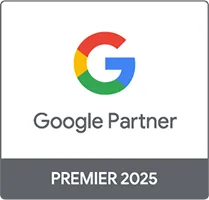Why Implement Google Ads With Your Business
“The competitive landscape has definitely changed for small businesses. Larger companies have adopted more advanced marketing strategies, which makes it hard for the SMBs to keep up. It’s also difficult for smaller companies to stay on top of digital marketing trends and market fluctuations since they are usually working overtime to manage day-to-day operations. When these companies outsource their PPC management to a Google Ads SMB Partner with more experience, research, and tools at their disposal, they’re able to see much better results.”
-Michael Weinhouse, Founder & Co-Chairman
What Being a Google Premier Partner Means for You
As a Google Ads Premier Partner, Logical Position has a large and loyal client base, as well as a team of trained and experienced Google Ads professionals. Our clients come to us because, as a Google Ads Certified Partner, we have the experience necessary to overcome challenging situations, and they can trust us to bring them the results they need to grow their businesses.
You’ve probably heard the term “Google Partner” before. But what does it mean to be a Google Ads Premier Partner (formerly, the Google Adwords Premier SMB Partner program)?
Google Ads Premier Partners are Google Partners who have larger client bases, more experience, and have seen overall success with their strategies. Generally, these Google Ads Certified Partners are more established companies with commitments to excellence working with Google Ads.
Frequently Asked Questions
Looking for something specific? We’re happy to help.
Reach out to our experts and get the answers you need.

